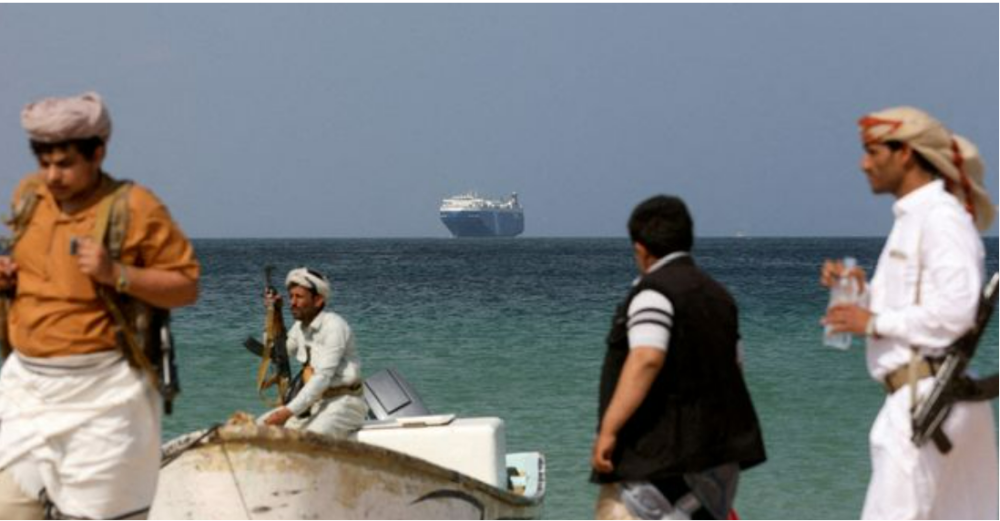Houthi strike a US-owned ship off the coast of Yemen in the Gulf of Aden


The attack on the Gibraltar Eagle, later claimed by the Houthis, further escalates tensions gripping the Red Sea after American-led strikes on the rebels.
The United Kingdom Maritime Trade Operations, which oversees Mideast waters, said Monday's attack happened some 110 miles (177 kilometers) miles southeast of Aden. It said the ship’s captain reported that the “port side of vessel hit from above by a missile.”
Private security firms Ambrey and Dryad Global told The Associated Press that the vessel was the Eagle Gibraltar, a Marshall Islands-flagged bulk carrier. The U.S. military's Central Command later acknowledged the strike.
“The ship has reported no injuries or significant damage and is continuing its journey,” Central Command said.
Houthi military spokesman Brig. Gen. Yahya Saree claimed the attack in a recorded television address that aired Monday night.
“The Yemeni armed forces consider all American and British ships and warships participating in the aggression against our country as hostile targets,” he said.
The vessel is owned by Eagle Bulk Shipping, a Stamford, Connecticut-based firm traded on the New York Stock Exchange. In a statement to The Associated Press, the company said the strike caused “limited damage to a cargo hold but (the ship) is stable and is heading out of the area.”
“All seafarers onboard the vessel are confirmed to be uninjured,” the firm said. “The vessel is carrying a cargo of steel products. Eagle Bulk management is in close contact with all relevant authorities concerning this matter.”
Satellite-tracking data analyzed by AP showed the Eagle Gibraltar had been bound for the Suez Canal, but rapidly turned around at the time of the attack.
Central Command said it detected a separate anti-ship ballistic missile launch toward the southern Red Sea on Monday, though it ”failed in flight and impacted on land in Yemen."
The U.S. Maritime Administration, under the Transportation Department, also issued a warning of a continuing "high degree of risk to commercial vessels” traveling near Yemen.
“While the decision to transit remains at the discretion of individual vessels and companies, it is recommended that U.S. flag and U.S.-owned commercial vessels” stay away from Yemen in the Red Sea and Gulf of Aden “until further notice,” the advisory said.
Separately, the British military said guards aboard a civilian ship off Eritrea fired warning shots on Monday to scare off a small boat near it in the Red Sea.
Sunday's missile launch toward the American warship also marked the first U.S.-acknowledged fire by the Houthis since America and allied nations began strikes Friday on the rebels following weeks of assaults on shipping in the Red Sea.
The Houthi fire in the direction of the USS Laboon, an Arleigh Burke-class destroyer operating in the southern reaches of the Red Sea, Central Command said.
The missile came from near Hodeida, a Red Sea port city long held by the Houthis, the U.S. said.
“An anti-ship cruise missile was fired from Iranian-backed Houthi militant areas of Yemen toward USS Laboon,” Central Command said. “There were no injuries or damage reported."
The Houthis did not acknowledge that attack.
It wasn’t presently clear whether the U.S. would retaliate for the latest attacks, though President Joe Biden has said he “will not hesitate to direct further measures to protect our people and the free flow of international commerce as necessary.”
The first day of U.S.-led strikes Friday hit 28 locations and struck more than 60 targets with cruise missiles and bombs launched by fighter jets, warships and a submarine. Sites hit included weapon depots, radars and command centers, including in remote mountain areas, the U.S. has said.
The Houthis have yet to acknowledge how severe the damage was from the strikes, which they said killed five of their troops and wounded six others.
U.S. forces followed up with a strike Saturday on a Houthi radar site.
Since November, the rebels have repeatedly targeted ships in the Red Sea, linked to Israel, saying they were avenging Israel’s.
The leader of the Lebanese Hezbollah group, Hassan Nasrallah, obliquely referenced the widening Houthi attacks on ships in a speech Sunday, saying that “the sea has become a battlefield of missiles, drones and warships” and blaming the U.S. strikes for escalating maritime tensions.
“The most dangerous thing is what the Americans did in the Red Sea, (it) will harm the security of all maritime navigation,” Nasrallah said.
The strikes in the Red Sea are also affecting shipping for the Middle East nation of Qatar, one of the world's top natural gas suppliers. Three liquid natural gas tankers that had recently loaded in Qatar and were bound for the Suez Canal remain idling off Oman, while another coming from Europe to Qatar remains off Saudi Arabia. QatarEnergy and government officials did not respond to a request for comment.

Sana’a – The Houthi-run Special Criminal Court in Sana’a has continued the trial of several former employees of the U.S. Embassy,…

Aden – Southern Transitional Council (STC)-affiliated forces on Saturday rejected accusations issued by Yemen’s General Staff, which cl…

Aden – Aidarus Qassem Al-Zubaidi, President of the Southern Transitional Council (STC) and Vice Chairman of Yemen’s Presidential Leader…